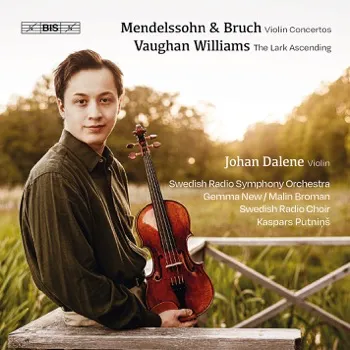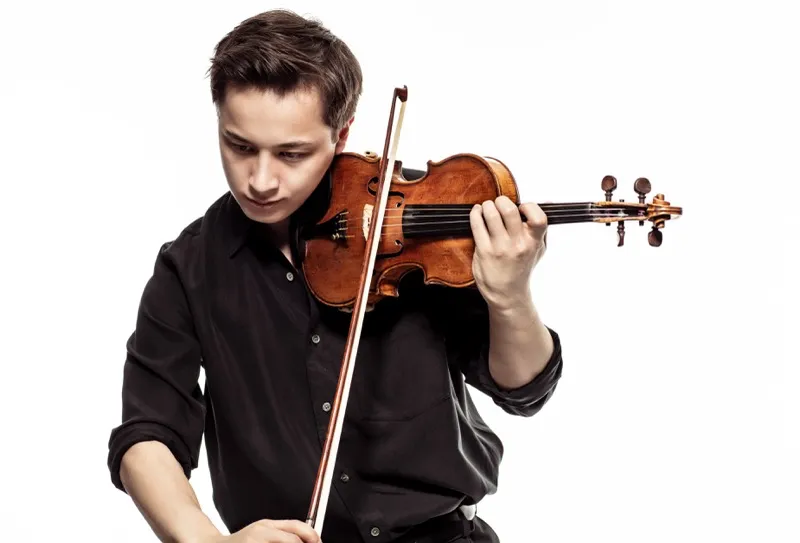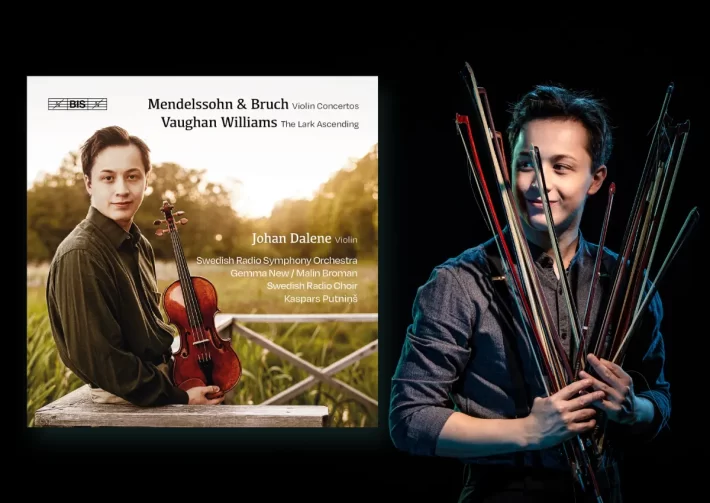Johan Dalene’s seventh BIS release couples two Romantic warhorses—Mendelssohn’s Violin Concerto and Bruch’s Violin Concerto No. 1—with a less familiar twist: Vaughan Williams’s The Lark Ascending in Paul Drayton’s arrangement for violin and choir.

In the Mendelssohn, Dalene and the Swedish Radio Symphony Orchestra find a persuasive balance between freedom and form. Nothing feels mannered: phrasing breathes, rubato is discreet, and Dalene’s use of glissandi and portamenti reads as an expressive resource rather than a retro nod. To take one example, hear how elegantly the players slow down to greet the arrival of the second subject in the first movement (track 1, 2’45”). Dalene’s color control is a strong suit; hushed pianissimi retain a central core, and full-throated fortissimi never harden. Technical hurdles are dispatched cleanly.
Leading from the concertmaster’s chair, Malin Broman keeps the ensemble tight and textures transparent. The woodwinds dovetail elegantly with the solo line in the finale (track 3, from 0’45”), and the whole performance keeps its buoyancy without tipping into saccharine. If there is a caveat, it’s in the slow movement, where one could wish for a shade more weight in the playing. The line remains poised and singing, but the movement’s inner gravity could have registered more strongly.
The Bruch concerto, under conductor Gemma New, shares many of the Mendelssohn’s virtues—clean articulation, handsome tone, and sensible pacing—though it leaves a slightly smaller imprint (perhaps because the work, as this listener hears it, is less inherently inspired than Mendelssohn’s.) Orchestral tuttis are well balanced, but Dalene’s playing of the dotted rhythms in the first movement could bite more, and the music would gain from a crisper rhetorical profile.
The second movement suits Dalene especially well: the cantabile unfolds naturally, the climactic swell is well shaped without strain (track 5, 6’00”), and the dialogue with the orchestra is sensitively judged.

Johan Dalene (images: © Mats Bäcker)
In the finale, Dalene and New favor classical clarity over grand, surging romanticism. That perspective is valid, but one key surge later on feels underplayed (track 6, 4’40”), so the run to the coda lacks the last degree of inevitability. New also makes too much of the accompanying woodwinds and brass, which may distract from the drama.
The album concludes with Paul Drayton’s 2019 arrangement of Vaughan Williams’s The Lark Ascending, with Kaspars Putniņš conducting the Swedish Radio Choir. This same arrangement was recorded by Jennifer Pike and the Swedish Chamber Choir on Chandos (review), but in different approach; where the Chandos recording favored blend and reserve, this new version is more dramatic, offers a greater dynamic range, and the sopranos sound particularly accomplished.
All in all, this is a very enjoyable album. Despite minor reservations in the Bruch concerto, the excellent performances continue to solidify Johan Dalene’s place as one of the most compelling young violinists on the scene today.
Recommended Comparisons
Mendelssohn
Bell | Chung | Midori | Ibragimova | Menuhin | Mullova
Bruch
Mutter | Benedetti | Goosby | Midori | Lin

Album Details |
|
|---|---|
| Album name | Mendelssohn & Bruch – Violin Concertos Vaughan Williams – The Lark Ascending |
| Label | BIS |
| Catalogue No. | BIS2610 |
| Artists | Johan Dalene (violin), Swedish Radio Symphony Orchestra, Swedish Radio Choir, Malin Broman, Gemma New, Kaspars Putniņš |



















